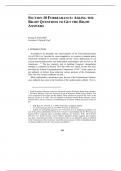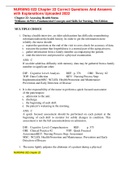SECTION 10 FORBEARANCE: ASKING THE
RIGHT QUESTIONS TO GET THE RIGHT
ANSWERS
George S. Ford, PhD†
Lawrence J. Spiwak, Esq.‡
I. INTRODUCTION
According to its preamble, the stated purpose of the Telecommunications
Act of 1996 is to “provide for a pro-competitive, de-regulatory national policy
framework designed to accelerate rapidly private sector deployment of ad-
vanced telecommunications and information technologies and services to all
Americans….”1 The key statutory tool to facilitate Congress’ deregulatory
mandate is contained in Section 10 of the 1996 Act2 which, for the first time,
provided the Federal Communications Commission (“FCC”) with express le-
gal authority to forbear from enforcing various portions of the Communica-
tions Act once certain conditions are met.3
While traditionally a backwater issue, the use of the Commission’s forbear-
ance authority has come to the forefront of the modern policy debate. For ex-
†
Chief Economist, Phoenix Center for Advanced Legal & Economic Public Policy Studies.
‡
President, Phoenix Center for Advanced Legal & Economic Public Policy Studies. The
views expressed in this paper are the authors’ alone and do not represent the views of the
Phoenix Center or its staff. We are indebted to Professor Randy Beard, Phoenix Center
Senior Fellow, for his assistance in formulating the economic models presented in this pa-
per.
1 H.R. REP. NO. 104-458, at 1 (1996) (Conf. Rep.) (emphasis added).
2 See Telecommunications Act of 1996, 47 U.S.C. § 160 (2012).
3 Indeed, the anticipated aggressive use of Section 10 over traditional regulation was
one of the prime justifications for the D.C. Circuit’s recent finding that the FCC may use
Section 706 as a separate source of ancillary authority. See Verizon v. FCC, 740 F.3d 623,
639 (D.C. Cir. 2014) (“In fact, section 706(a)’s legislative history suggests that Congress
may have, somewhat presciently, viewed that provision as an affirmative grant of authority
to the Commission whose existence would become necessary if other contemplated grants
of statutory authority were for some reason unavailable.”).
126
,2014] COMMLAW CONSPECTUS 127
ample, with the Internet Protocol Transition4 underway, using Section 10 to
dismantle what is left of the 1996 Act’s unbundling requirements—a paradigm
essentially rendered moot by a series of court decisions and, ultimately, its own
2004 Triennial Review Remand Order5—has proven to be a contentious issue
at the Commission.
To wit, in December 2005, the agency forbore from many of the remaining
unbundling requirements, including unbundled loops, in parts of the Omaha
Metropolitan Statistical Area (“MSA”). The Commission hinged its decision
largely on the presence of a facilities-based competitor (i.e., a cable company),
which covered much of the Omaha market, determining that this level of facili-
ties-based competition was sufficient to protect end-users as effectively as reg-
ulation does in the absence of such competition.6 Yet, four years later, the
4 See generally In the Matter of Technology Transitions, Order, Report and Order and
Further Notice of Proposed Rulemaking, Report and Order, Order and Further Notice of
Proposed Rulemaking, Proposal for Ongoing Data Initiative, FCC 14-05 paras. 5-6, 8, (Jan.
31, 2014) (discussing experiments in IP transition).
5 See In the Matter of Review of the Section 251 Unbundling Obligations of Incumbent
Local Exchange Carriers, CC Docket No. 01-338, Report and Order and Order on Remand
and Further Notice of Proposed Rulemaking, 18 FCC Rcd 16978, 16984 (Feb. 20, 2003)
Direction from the courts, our own experience, and the experience of the telecommuni-
cations industry over the last seven years have caused us to reevaluate the Commis-
sion’s approach to these obligations in light of the Act’s goals of opening local ex-
change markets to competition, fostering the deployment of advanced services, and re-
ducing regulation. Although we recognize that Congress intended to create a competi-
tive landscape through resale, interconnection and facilities-based provision, and a
combination of these modes of entry, in practice, we have come to recognize more
clearly the difficulties and limitations inherent in competition based on the shared use
of infrastructure through network unbundling.
[hereinafter Triennial Review Remand Order]. Id.
6 See In the Matter of Petition of Qwest Corporation for Forbearance Pursuant to 47
U.S.C. § 160(c) in the Omaha Metropolitan Statistical Area, Memorandum Opinion and
Order WC Docket No. 04-223, 20 FCC Rcd 19415 paras. 61, 72, 78, (Sept. 16, 2005), aff’d
Qwest v. FCC, 482 F.3d 471 (D.C. Cir. 2007) [hereinafter Omaha Forbearance Order]. The
agency did not consider non-cable VoIP providers or competition from mobile wireless. Id.
para. 72
Because Qwest has not submitted sufficient data concerning the full substitutability of
interconnected VoIP and wireless services in its service territory in the Omaha MSA,
and because the data submitted do not allow us to further refine our wire center analy-
sis, we do not rely here on intermodal competition from wireless and interconnected
VoIP services to rationalize forbearance from unbundling obligations.
Id. In terms of line counts, unbundling was not far from its peak at the time, though the Tri-
ennial Review Remand Order had already begun to take its toll (unbundled loop counts fell
by one-third between June 2005 and June 2006). See FED. COMMC’NS COMM’N, LOCAL TEL-
EPHONE COMPETITION: STATUS AS OF JUNE 30, 2006 (2007), available at
http://bit.ly/1GRS86d (multiple years, Table 4).
,128 Section 10 Forbearance [Vol. 23
agency would forcibly reject the same request by Qwest within the Phoenix
MSA, batterfanging its earlier decision in the Omaha Forbearance Order.7 In
the Phoenix Forbearance Order, the Commission used an antitrust-type “mar-
ket power” methodology, which arguably established an impossible threshold
for forbearance of unbundled network elements, rendering moot Section 10 as
a deregulatory tool.8 As a direct result, pending forbearance petitions on un-
bundling mandates were subsequently withdrawn and none have been filed
since then.9
In this paper, we use the Phoenix Forbearance Order as a template for out-
lining how the Commission can improve its forbearance analysis for the un-
bundling provisions in the 1996 Act so that its approach is more consistent
with the economic realities of communications markets and the statute. Our
proposals are not a panacea for forbearance policy—there is no one-size-fits-all
approach to the varied aspects of forbearance. Nevertheless, improved legal
and economic analysis can be used to refocus the Commission’s efforts. We
also stress that our analysis is not intended to encourage either approval or de-
nial of forbearance petitions—each is unique—but rather to aid in the assess-
ment of the individual cases in a rational, logical manner.
We also consider how the Phoenix Forbearance Order impacts the use of
Section 10 to write a set of legally-sustainable Open Internet rules. While the
Commission has proposed to move forward using its authority under Section
706,10 there are increasing calls for the Commission to reclassify broadband
7 In the Matter of Petition of Qwest Corporation for Forbearance Pursuant to 47
U.S.C. § 160(c) in the Phoenix, Arizona Metropolitan Statistical Area, Memorandum and
Order WC Docket No. 09-135, 25 FCC Rcd 8622 paras. 2, 21, 24, 109, (June 15, 2010),
aff’d, Qwest v. FCC, 689 F.3d 1214 (10th Cir. 2012) [hereinafter Phoenix Forbearance
Order]. At the time of the request, the nationwide count of unbundled loops was now less
than half the 2005 level and falling fast. See STATUS AS OF JUNE 30, 2006, supra note 6 (mul-
tiple years, Table 4).
8 George S. Ford & Lawrence J. Spiwak, The Impossible Dream: Forbearance After
the Phoenix Order, PERSPECTIVES: PHOENIX CENTER FOR ADVANCED LEGAL & ECON. PUB.
POL’Y STUD 1 (Dec. 16, 2010), http://bit.ly/1DQ2c3n.
9 The impossible-to-satisfy standard has not been lost on those acquiring inputs from
the Incumbent Local Exchange Carriers (ILECs). There have been requests for the Commis-
sion to apply its new “market power” approach to its past deregulatory decisions. See, e.g.,
In the Matter of Special Access for Price Cap Local Exchange Carriers; AT&T Corporation
Petition for Rulemaking to Reform Regulation of Incumbent Local Exchange Carrier Rates
for Interstate Special Access Services, Report and Order WC Docket 05-25, 27 FCC Rcd
10557, at 133 (Aug. 22, 2012) (describing the substantial resources the Commission devoted
to withdrawn forbearance petitions).
10 In the Matter of Protecting and Promoting the Open Internet, Notice Of Proposed
Rulemaking, GN Docket No. 14-28, 29 FCC Rcd 5561 paras. 143-47, (May 15, 2014) [here-
inafter 2014 Open Internet NPRM].
, 2014] COMMLAW CONSPECTUS 129
Internet access as a common carrier telecommunications service but to use ag-
gressively its authority under Section 10 to create some form of “Title II Lite.”
As we will show below, however, this approach is legally suspect. Given the
Commission’s findings that (a) the relevant market for purposes of the Open
Internet is the “termination” side of the market; and that (b) Broadband Service
Providers are “monopolists” (i.e., “dominant”) in this termination market, for-
bearance cannot be used to create what is colloquially referred to as “Title II
Lite.” In fact, if retail broadband Internet access (rather than the termination
service) is classified as a Title II service, then the Commission’s stance on
broadband competition combined with its findings in the Phoenix Forbearance
Order likely require, for the first time, the price regulation of all retail broad-
band connections.
II. STATUTORY BACKGROUND: SECTION 10
It is a well-established principle of administrative law that an agency may
modify or eliminate its regulations.11 What an administrative agency generally
may not do, however, is forbear from relevant portions from its statutory man-
date.12 Such was the case of the FCC, which prior to the passage of the Tele-
communications Act of 1996, lacked any authority to forbear from the assorted
statutory mandates contained in the Communications Act of 1934.13 As a re-
sult, the agency was often forced to engage in legal gymnastics to avoid statu-
tory mandates that had all-too-obviously outlived their usefulness, sometimes
failing in these efforts.14 Recognizing this problem, and consistent with the de-
regulatory philosophy articulated in the 1996 Act’s preamble, Congress in-
11 See, e.g., Telecommunications Act of 1996, 47 U.S.C §154(i) (2012) (“The Commis-
sion may perform any and all acts, make such rules and regulations, and issue such orders,
not inconsistent with this chapter, as may be necessary in the execution of its functions.”).
12 Id.
13 See discussion in MCI World Comm. Inc., et al., v. FCC, 209 F.3d 760, 762 (D.C.
Cir. 2000).
14 For example, this inability to forbear was one of the primary motivations behind the
Commission’s dominant/non-dominant paradigm for long distance services: i.e., dominant
firms’ tariffs were generally subject to 45 days notice and comment but, lacking the ability
to forbear, in order to minimize regulatory burdens on new entrants, the Commission pre-
sumed that non-dominant firms’ tariffs were just and reasonable after only one day notice.
See MCI v. AT&T, 512 U.S. 218, 242 (1994) (“The FCC has in effect adopted a general
rule stating that ‘if you are dominant you must file, but if you are nondominant you need
not.’”). When the FCC tried to eliminate tariff requirements for non-dominant long-distance
carriers altogether, the Supreme Court held that the agency lacked this authority. See id. at
220, 222.





